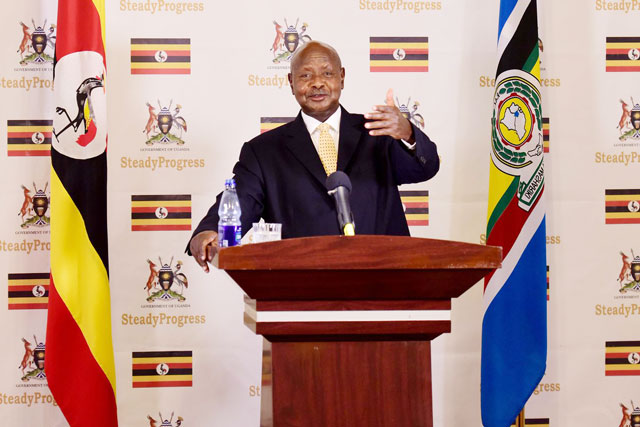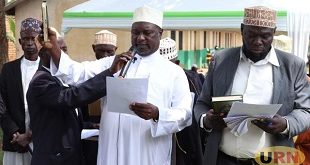
What experts think is important in regard to president’s message
Kampala, Uganda | JULIUS BUSINGE | Gideon Badagawa, the executive director at the Private Sector Foundation Uganda (PSFU), says President Yoweri Museveni’s New Year speech with regard to value addition was well-intentioned.
“The concentration of the speech on value addition was spot-on,” he said. Badagawa, who has worked with the Foundation for more than a decade, however, said as the country awaits to achieve the middle income status – where everyone would earn at least US$1,000 per year compared to US$615 as of 2016 – the government’s main focus should now be on import substitution and exports while using the local market to support local industries.
Data from Bank of Uganda shows that the country’s import bill stood at US$5.3bn compared with US$2.9bn as export revenues as at the end of 2016.
Badagawa also suggests increasing access to cheap long term credit to the private sector, improving government efficiency and coordination amongst government agencies, fighting corruption, improving standards and market access, and above all cutting government expenditure on less important activities and sectors which consume taxpayers’ money.
“The government needs to support the private sector in building capacity in research and development for purposes of increasing production and productivity,” he said, citing South Africa, Columbia, Vietnam and China where governments have a direct intervention in supporting the private sector for growth.
He said the government should also pay domestic arrears for the private sector amounting to Shs 2.7 trillion as well as amend the NSSF Act to allow those falling out of the saving bracket to come onboard – a move that would support the economy.
But economic commentators including Isaac Nkote, a senior lecturer of economics at Makerere University Business School (MUBS) say Museveni’s speech on the three economic areas – accelerating agriculture, increasing Foreign Direct Investment (FDI) and strengthening regional integration – was a good idea but added that genuine investors never come in a year.
He said prospective investors are never speculators and therefore have to study the market factors – politics, labour, infrastructure, market, security, and tax and foreign exchange policies – prior to making investment decisions.
“…some can even take three years to come back,” he told The Independent in an interview adding, “Maybe those that were here years back are the ones that will come in 2018.”
Even if investors were to come, Nkote says, Uganda’s per capita income is still small to support businesses.
He said government initiatives this year should focus on helping private companies appreciate the benefits of being taken over by foreign big companies that can expand and create opportunities related to standards and increase in output.
On irrigation, Nkote says it makes little business sense to invest in huge irrigation farming when there are no big players in agriculture.
“First attract big commercial farmers by giving them land and other incentives before you establish these irrigation schemes, he said, suggesting that government can give small irrigation equipment to organized farmers in the short term to increase their production capacities.
Moses Khisa, a political commentator and assistant professor of political science at North Carolina State University in the US said Museveni’s longevity in power is growing Uganda’s future political risk which has a connection with investment and general economy performance.
He said in his column in The Observer Newspaper that as Uganda was ushering in a New Year, people were treated to the same old dose of condescending falsehoods and misleading narratives.
This was in reference to President Museveni’s New Year message, in which, he promised to attract more investors into the country citing among others abundant raw-materials; agricultural resources; fresh water resources; forest resources; good climate, tourism resources and improved transport infrastructure services.
He also promised to tame drought that reduced output especially in 2016 through the establishment of solar powered water pumps and large scale irrigation schemes including, DohoPhaze II in Butaleja District, Mubuku Phaze II in Kasese District, Wadelai in Nebbi District, Tochi in Oyam District, Ngenge in Kween District, Igogero Naigombwa in Namutumba District, Katete in Kanungu District and Kawumu in Luwero District.
BoU prediction
Issuing the monetary policy statement at the end of last year, Deputy Governor, Louis Kasekende, however, said Uganda’s economy is expected to expand at a faster pace in the medium term boosted by public investments, increasing growth in consumption and improved agricultural productivity.
He said projections are that the economy would record improvement in Gross Domestic Product to 5-5.5% by end of this financial year (2017/2018), which is higher than 4.0% registered a year earlier while headline and core inflation are forecast to converge to the 5% target in the medium term.
He, however, warned about upside risks to this outlook, including the future direction of food crops prices and the path of the exchange rate, with the latter contingent on the external economic environment.
 The Independent Uganda: You get the Truth we Pay the Price
The Independent Uganda: You get the Truth we Pay the Price



